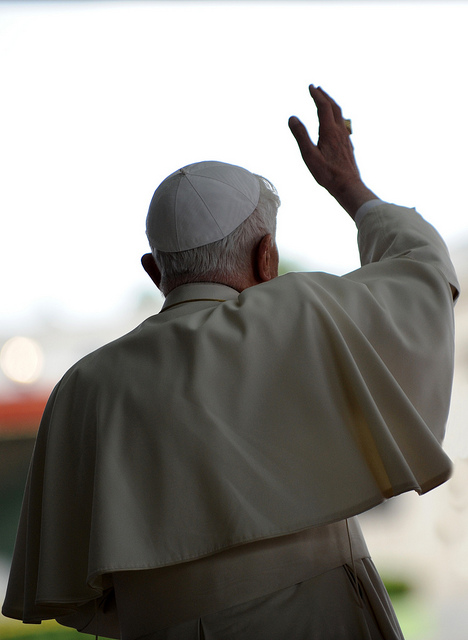
The first thing that sprung to mind when I learned that Pope Benedict was resigning from his station of service was a series of quips and puns.
WWBD? He’d quit.
Two living popes in Rome? It’s like Buffy and Faith all over again.
Well this is a good way of dodging the child abuse scandal, no?
My Catholic grandmother is in her 80’s too, but I think if she was called to be the voice of Christ she would do it to the death. Just sayin’.
They kept going for several minutes. It wasn’t my most sensitive, kind-hearted moment, but it was funny.
Once the fairy dust settled a bit, my husband and I began to consider the real conflict this would (or, perhaps should) create in the hearts and minds of Catholics. This situation, the leader of the Catholic church resigning his position — a position which make him the mouthpiece of the Godhead, the voice of Christ in the world — calls so many things into question for the faithful, doesn’t it?
As the title of this post says, I’m not Catholic. But what about my grandmother and my aunt? A great deal of my family is Catholic, and there will likely be readers of this blog who know and love Catholics. While it is easy to make fun of this situation, especially for those who found the current pontiff’s politics to be unsavory, I wonder if that response is really appropriate or helpful.
This is not my crisis of faith, admittedly, but it is a crisis of faith for others. As I consider what it means to be a servant to my community, and a believer in interfaith dialogue to boot, what is the best response to a situation such as this?
Humanism, perhaps? Is the best interfaith response to a religious crisis one that does not acknowledge at all the religious implications, but rather seeks to focus on the struggle of the individual?
I’m reminded of Chris Stedman, the author of this month’s Bishop In The Grove Book Club book, Faitheist. He is not a religious man, but he has dialogue with the religious. In my personal conversations with him I’ve found him to be incredibly compassionate and caring. As a humanist Chaplain, I wonder what it would be like for him to be approached by someone in a religious crisis. What would Chris Stedman do? (#WWCSD)
This puts into context why reading this book is valuable at this time. I’ve often wondered if the religious (i.e. theists of all sorts) can learn something from their non-religious counterparts. Could we take a lesson from them on how to reach out to one another on a purely human level? Does the humanist movement provide the religious with a reminder that our religiosity doesn’t always encourage us to be better humans to one another? And if we find that it doesn’t, does that mean that we should re-evaluate our religion?
I don’t know the answers to these questions.
There are many atheists in the Pagan world. Some of them write brilliantly about their perspectives. At times these voices sound most reasonable and compassionate, such as in the case of John Halstead or B.T. Newberg. Halstead is always rooting things back into his ordinary life, filled as it is with ordinary, sometimes very difficult challenges, and Newberg’s writing inspires me to think more deeply about how I’m rooted in the world (and how the world is rooted in me). This current crisis in the Catholic Church doesn’t belong to either of them, but I wonder how they might respond to it as humanists.
And I wonder how you might respond.
Do you find yourself responding with humor to this situation? With compassion?
Is your perspective about this transition — a historic one, for certain — colored by your own religious beliefs and practices? Is there any way for you to hold space for those who value the institution of the Catholic Church, or is that an unacceptable proposition for you?
What’s your take?
Leave a Reply